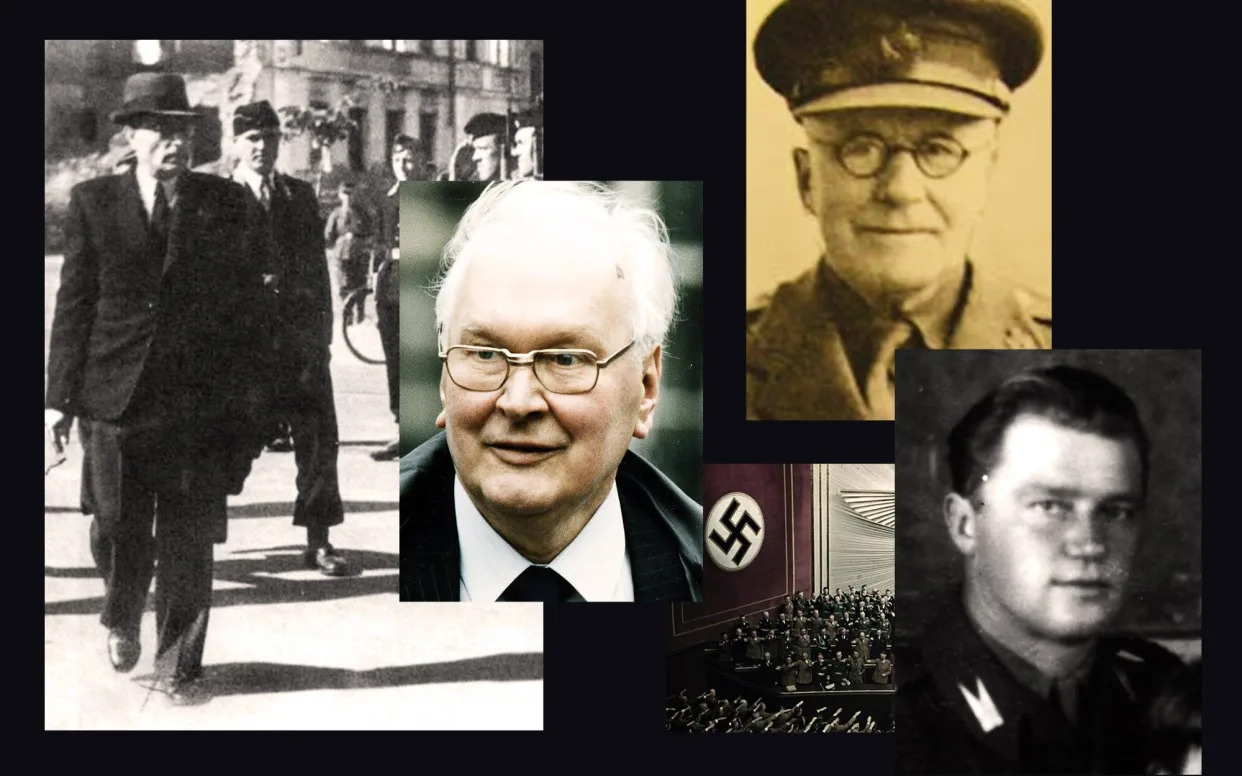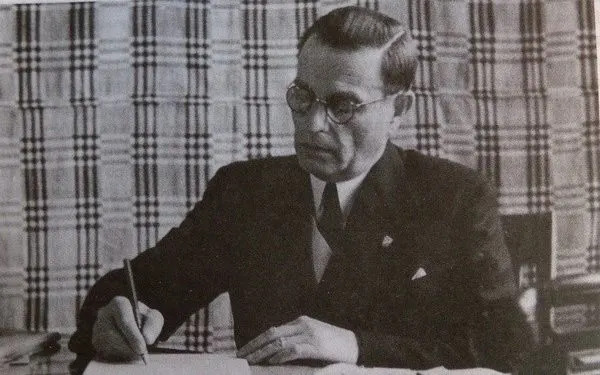BOOK EXCERPT
How the British justice system allowed Nazi war criminals to live undetectedJon Silverman
Fri, September 29, 2023

In July 1995, 84-year-old Szymon Serafinowicz shuffled into the spotlight after 40 years of suburban anonymity in the Surrey commuter belt town of Banstead. To the astonishment of neighbours, who had taken him to be an unassuming pensioner, he was the first person to be prosecuted for murder under the 1991 War Crimes Act, accused of Holocaust atrocities more than half a century old.
But after two years of delay, Serafinowicz was found to be suffering from Alzheimer’s, and his trial, due to be held at the Old Bailey in 1997, was never held. His crimes were thus never fully revealed. And his victims, accordingly, were never granted a measure of posthumous justice.
Now, however, those wrongs can be righted, as research conducted with Robert Sherwood for our new book reveals definitively for the first time his wartime monstrosities, and how the failings of the British justice system over many decades allowed Serafinowicz and others like him to escape prosecution.
Serafinowicz, it turns out, was a man with a remarkable and unsavoury past, a murderer of Jews in his native Belarus and a henchman of the wartime puppet leader of the occupied territory, who spent a lifetime trying to overthrow Soviet rule.

Then and now: Serafinowicz – unassuming-looking in later life
During the war, he was the commander of auxiliary police, known by the Germans as schutzmannschaften, in the towns of Mir and Turets in what was then Belorussia. The original source of the allegations against him was an investigation conducted by a team from the Soviet secret police NKVD team in 1945. It was an audit of atrocity: “2,754 people from Mir district killed, tortured, or burnt alive listed – 1,750 in Mir, 450 in Turets. The main criminals in the area were: Serafimovitch Semion [the Russian spelling of his first name]...”
Serafinowicz seems to have been driven by revenge. In the winter of 1939-40, when Belorussia fell under Soviet rule as part of the Nazi-Soviet pact that divided up Poland, his wife’s parents were deported to central Russia and did not survive. As the manager of a flour mill, Serafinowicz himself is likely to have been regarded by the Soviets as ‘suspiciously bourgeois’. But after the Nazis turned on the USSR and began operation Barbarossa in 1941, Belarus fell under German control.
As a virulently anti-Communist Belorussian nationalist, Serafinowicz confessed to Scotland Yard officers in 1993 that in 1943 he was handpicked by Belorussia’s pro-Nazi quisling, Radoslav Ostrowski, to form a so-called Jagdzug. The purpose of these units was to track down Jews who had escaped organised massacres. Ultimately, about four in five of the pre-war Jewish population of Belorussia, over half a million people, were murdered by the Nazis and their local allies.
Despite such murderous anti-Semitism, Ostrowski was welcomed to Britain after the war. In 1950, for example, he travelled to Edinburgh for a conference of the Anti-Bolshevik Bloc of Nations. By this time, Serafinowicz too had landed on these shores.
By day he was a labourer on building sites in London; by night, a senior activist in various anti-Soviet nationalist organisations – which used to meet at Ostrowski’s home in Cathnor Road, Shepherd’s Bush.

Ostrowski was said to have recruited Serafinowicz to form a Jagdzug, to track down Jews who had escaped massacre
This despite the fact that, as early as 1947, M15 had passed on allegations to the Home Office that Serafinowicz was a war criminal. Serafinowicz had arrived in the UK, like many of his fellow Belorussian nationalists, the previous year, claiming to have fought with the Free Polish Forces, who were allies of Britain. But he was denounced as a killer by a fellow soldier and implicated in executions and the burning of villages.
What happened next is a scar on the reputation of Britain’s celebrated interrogator of captured Nazis, Colonel Alexander Paterson Scotland, who commanded the London Cage, which had become the home of the War Crimes Investigation Unit after the war.
It was he who was charged with carrying out an investigation into Serafinowicz. The quality of Scotland’s inquiry can be judged by his report: “Serafinowicz was brought to the London Cage on 30 April. Serafinowicz makes a good impression, he is a pleasant and easygoing type, has a somewhat sly character, possessing a slightly shifty eye, but could not be described as anything approaching a brutal type.”

Paterson, who carried out an investigation into Serafinowicz, but deemed him ‘pleasant and easygoing’
Scotland’s casual exoneration of a man responsible for many hundreds of deaths could be said to be emblematic of Britain’s response to the presence of war criminals in its midst until the passage of the 1991 War Crimes Act. But, as our book reveals, even armed with criminal legislation, the legal authorities provided no more than a scant measure of justice for the victims.
Other suspects accused of even more egregious atrocities did not even suffer the indignity of prosecution. Take, for example, Harijs Svikeris, a long-time resident of Milton Keynes, who was presumed to be one of the three “strongest” cases when the war crimes inquiries began. Svikeris, a Latvian, had been a platoon captain in the infamous Arãjs Kommando, a unit established for the sole purpose of ridding their country of Jews and Communists and, with merciless savagery, proved remarkably successful in doing that.
Over the years, fellow members of the Kommando testified about Svikeris’s role in killings in both Latvia and Belorussia. When I spoke to the head of Scotland Yard’s War Crimes Unit, Chief Supt. Eddie Bathgate, shortly after he retired, he admitted: “Svikeris was a powerful case and I would cheerfully have put him on the charge sheet. The interviews with him were videotaped and you could see he was guilty. One of my last remarks to the CPS was ‘you are not going to be able NOT to prosecute Svikeris’.” But prosecutors refused to proceed without the testimony in open court of eyewitnesses to his crimes.
There was one case that garnered attention even before the War Crimes Act was passed. Anton Gecas, a former National Coal Board manager, living in Edinburgh, had previously gone by the name Antanas Gecevicius and had been a commander of the 12th Lithuanian Auxiliary Police Battalion, whose wanton cruelty in murdering the Jews of Slutsk in 1941 was cited at the Nuremberg Tribunal.
Gecas sued Scottish Television for defamation over a documentary detailing his participation in massacres in Belorussia. He lost the case at the Court of Session in 1992, the judge, Lord Milligan, declaring that he was ‘clearly satisfied’ that Gecas was a war criminal. He too was never tried, for the same reason as Svikeris.

War criminal Gecas lived in Edinburgh, having worked as a manager at the National Coal Board - PA
This is a story about a palpable lack of judicial transparency. Neither Scotland Yard nor the CPS published a final report on the war crimes inquiries. Had they done so, questions would undoubtedly have been raised about the delay in bringing Serafinowicz to full trial, ignoring a key recommendation that the age of witnesses and potential defendants would mean that justice delayed was bound to be justice denied.
It is time to admit that the due process of law denied by the Nazis to their victims has shielded many of the perpetrators to the bitter end. If there is any justice to be found, it may lie with the demise of Svikeris. In July 1995, shortly after the UK announced the prosecution of Serafinowicz, Svikeris suffered a fatal heart attack at his home in Milton Keynes. It was reported that he died clutching a newspaper open at a page that carried the headline: ‘First man to be charged with Nazi war crimes arrested in Surrey’.
Safe Haven: The United Kingdom’s Investigations into Nazi Collaborators and the Failure of Justice by Jon Silverman and Robert Sherwood is published by Oxford University Press on October 5, 2023.
No comments:
Post a Comment